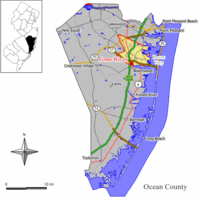The Toms River, formerly Tom's River, is a 41.7-mile-long (67.1Â km) freshwater river and estuary in Ocean County, New Jersey in the United States.
The Toms River rises in the Pine Barrens of northern Ocean County and flows southeast and east, fed by several branches, in a meandering course through wetland area and empties into Barnegat Bay, an inlet of the Atlantic Ocean. The lower 5Â mi (8Â km) of the river is a broad tidal estuary navigable within the community of Toms River. The lowest reaches of the river provide convenient locations for marinas and yacht clubs and excellent points from which to go fishing and crabbing. Canoeing and kayaking are also popular pursuits on the Toms. The river can be paddled for 21.7 miles (34.9Â km) from Don Connor Boulevard below Route 528 all the way to Barnegat Bay.
In the 1960s, the lower river was found to have been polluted for many years from the open discharge of waste from a Ciba Geigy dye manufacturing plant. This was considered to have been the cause of a cancer cluster of leukaemia in the Toms River township that led to multi-million dollar compensation payments to the families involved. There is a 'great deal of uncertainty' as to if the pollution was a causal factor in the cancer cluster. A 2014 Pulitzer Prize winning book examined the issue in detail. Recent public-private coalitions to restore the river and to purchase and preserve the wetland areas near its source in the Pinelands have resulted in an increase in water quality.
The Toms River was known as Goose Creek until it was renamed in the early 18th century either for English captain William Toms, farmer and ferryman Thomas Luker, or a Native American named Tom. The settlement that was founded in 1712 along the river subsequently took the name as well.
§Tributaries

- Union Branch
§See also

- List of New Jersey rivers
- Cancer cluster
§References

§External links
- U.S. Geological Survey: NJ stream gaging stations
- Toms River Online - Community Information Portal






0 komentar :
Posting Komentar